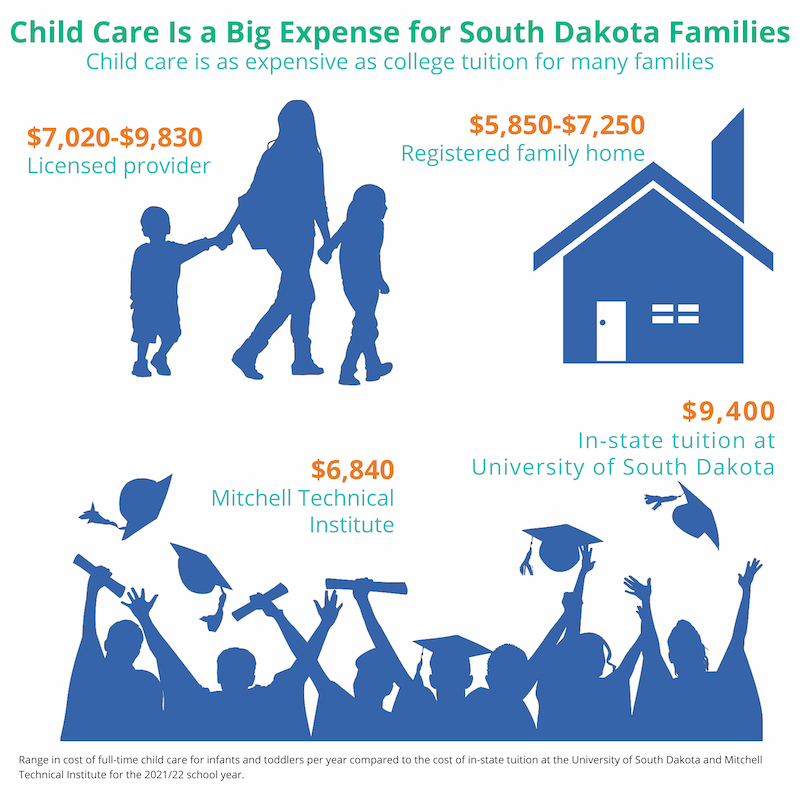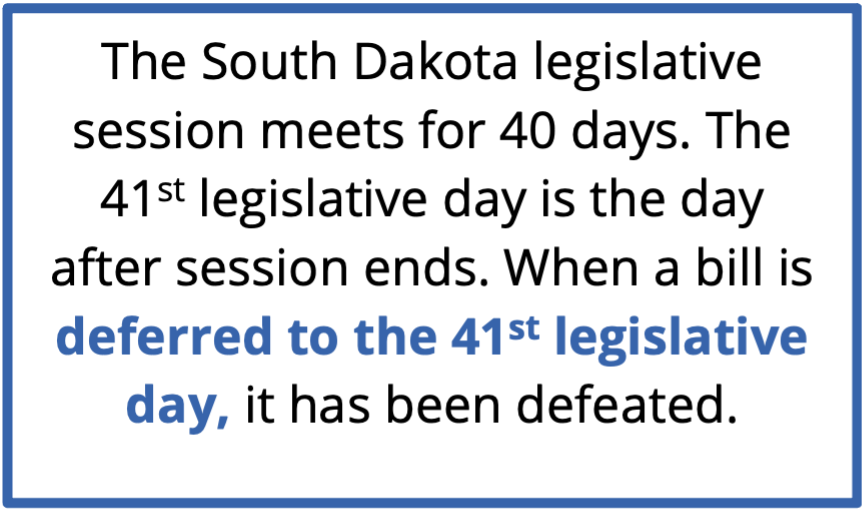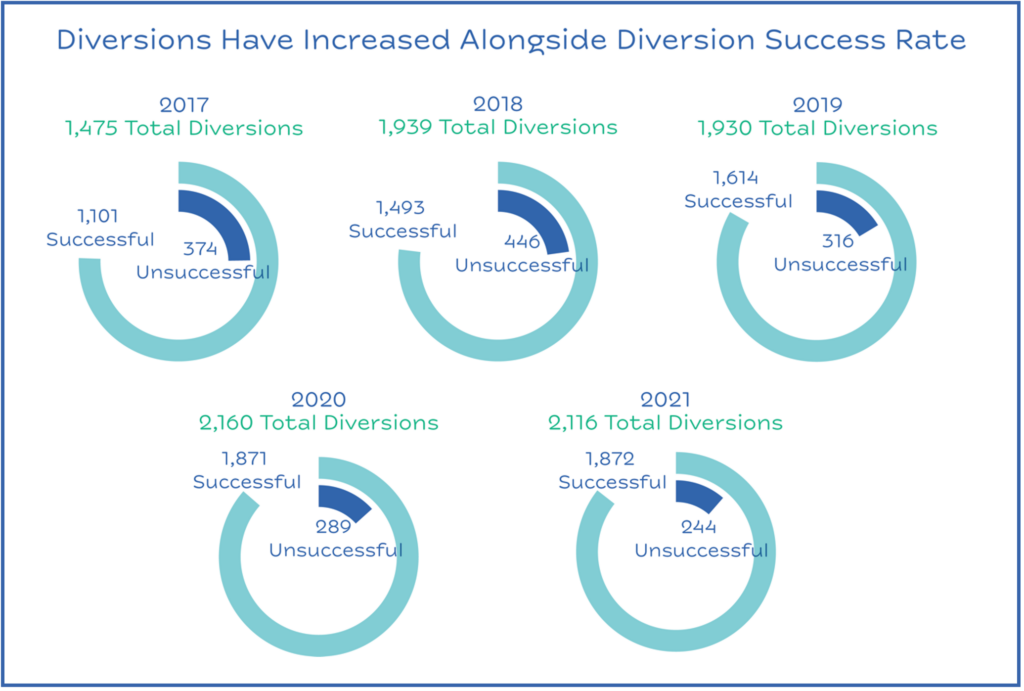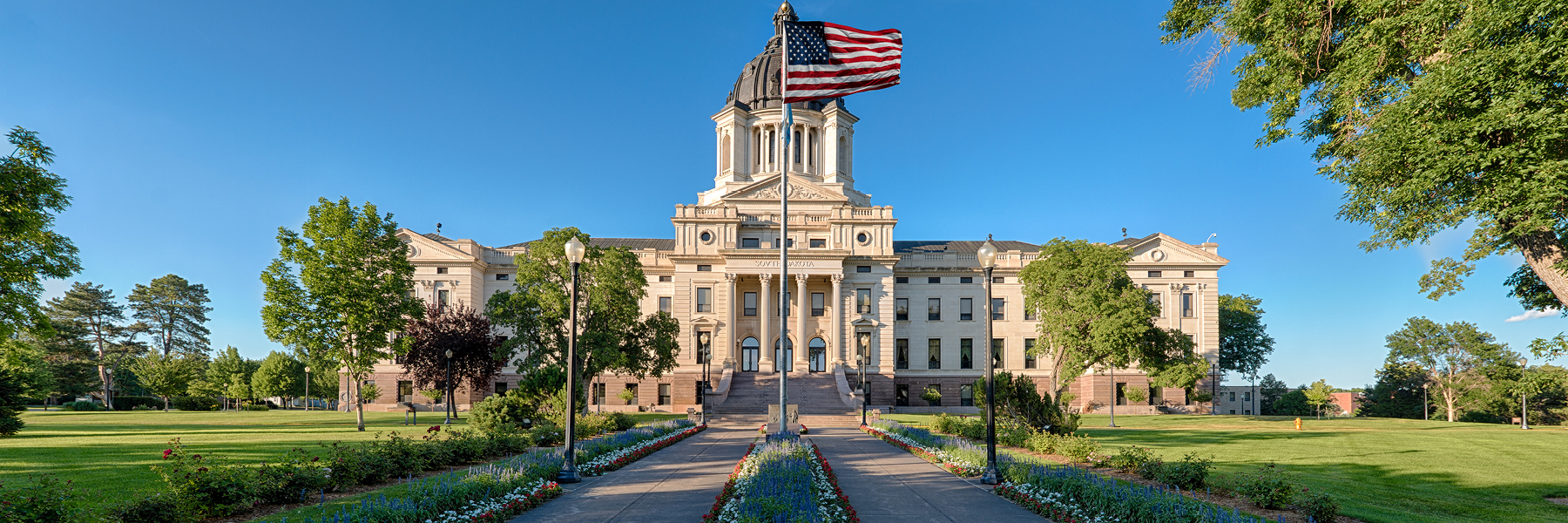2022 Legislative Session: Children’s Well-Being Bills
April 2022
The 2022 South Dakota Legislative Session wrapped up at the end of March. Legislators introduced 553 bills, the highest number of bills considered in the last five sessions. South Dakota KIDS COUNT developed a Legislative Tracker for Children’s Well-Being Bills and monitored the progress of 36 bills related to child and family well-being.
Child Care and Early Childhood Education

Despite increased interest to support child care across South Dakota, no bills passed to improve access and affordability of child care. Child care is a significant expense for South Dakota families. Full-time infant care at a licensed provider costs as much as in-state tuition at the University of South Dakota. This means paying between $7,020 and $9,830 per year to send an infant to full-time care. Child care businesses often sacrifice worker pay to balance the actual cost of care with what parents can afford. Median yearly income for child care workers is only $21,610 if working full time. South Dakota needs innovative, long-term solutions to build a better child care system that works for children, parents, and businesses.
Three proactive bills related to early childhood education were proposed but did not pass.
- House Bill 1222 would have provided up to a 20 percent reduction in property assessed value for calculating property taxes if the home is used for family child care. There are about 370 registered family child care providers in South Dakota, and the state lacks the data to know how many unregistered family child care providers may exist. The bill failed on a 23-44 vote in the House.
- Senate Bill 194 would have appropriated $1 million to the Department of Education for technology-based, in-home early education services for children. Waterford Upstart would have matched $1million to continue the in-home kindergarten readiness program. Waterford Upstart’s program includes 15 minutes of online instruction for children and support for parents through a family coach. This appropriation plus the matching funds would have provided 1,500 slots for kids to participate. Senate Committee on Appropriations deferred the bill to the 41st legislative day.

- House Bill 1333 would have appropriated $62 million in child care stabilization grants as part of the federal American Rescue Plan Act. The proposed bill gives the Department of Social Services authority to spend the federal funds. The House of Representatives tabled House Bill 1333 as spending authority was already included in the current general appropriations bill (see Senate Resolution 701). Eligible providers that applied for stabilization grants were awarded funding in early February and providers received $35.3 million as of March 29, 2022.
Juvenile Criminal Legal System
The juvenile criminal legal system was a topic with increased interest for policy proposals during the 2022 session. The last major reform of the juvenile criminal legal system in South Dakota was during the 2015 legislative session when the Juvenile Justice Public Safety Improvement Act passed. The reform from 2015 expanded the use of diversion programs and the availability of community-based services to keep youth in their community and connected to resources. Diversions have increased across the state and the success rate of diversions has also improved. Most youth (88 percent) in diversion programs do not re-offend.

Legislators brought forward two bills related to juvenile justice during the session.
- Senate Bill 103 appropriates $500,000 for the teen court grant program. Teen court is one example of a diversion program. Youth attend a hearing where their peers volunteer for court roles like juror or clerk. No formal charge is given through the teen court. Instead, a peer jury determines a constructive sentence for participants. This bill passed out of the House (61-8) and Senate (34-1) and was signed into law by the Governor.
- Senate Bill 198 would have created an interim committee to consider alternative placements for juvenile offenders. The bill’s original version repealed much of the current law governing juvenile justice practices. However, the House version removed any changes to current law and only proposed an interim study. Ultimately, the House and Senate did not concur on Senate Bill 198 and the bill did not become law.
The Executive Board of the South Dakota legislature identified juvenile criminal legal reform as a topic to study during the interim. Interim committee members for the study will be determined later in April.
Education Equity
Legislators introduced five bills related to education equity that supported more inclusive education environments for American Indian students. Sponsors and proponents of these bills cited the disparities that exist for Black, Indigenous, and children of color for educational outcomes in South Dakota. These disparities are a product of generations of discrimination, chronically underfunded programs promised as part of Native American treaties with the U.S. federal government, and lack of cultural representation in public schools. None of the five bills passed during the session.
- House Bill 1170 would have incorporated the Oceti Sakowin Essential Understandings in the social studies curriculum and provided an opportunity for all elementary and secondary students to focus on the heritage and history of the nine federally recognized tribes in this state. The House Education Committee deferred the bill to the 41st legislative day.
- House Bill 1186 would have allowed enrolled members of federally recognized tribes to attend a higher education institution in South Dakota without paying tuition once all federal tuition benefits were exhausted. The House Education Committee tabled this bill on a 12-2 vote.
- House Bill 1189 would have appropriated $1.5 million to fund the Native American achievement schools grant program. A school would have been eligible for the grant if at least 50 percent of students are Native American, and the school performs below the statewide average proficiency in math and English language arts. The House Education Committee deferred the bill to the 41st legislative day.
- House Bill 1191 would have appropriated $2 million to provide grants to children’s first learning centers that promote the teaching of the Lakota language on the Rosebud Sioux Reservation. The House Education Committee deferred the bill to the 41st legislative day.
- Senate Bill 139 would have created and funded two Oceti Sakowin community-based schools. The bill passed out of the Senate (22-13), but the House Education Committee deferred it to the 41st legislative day.

